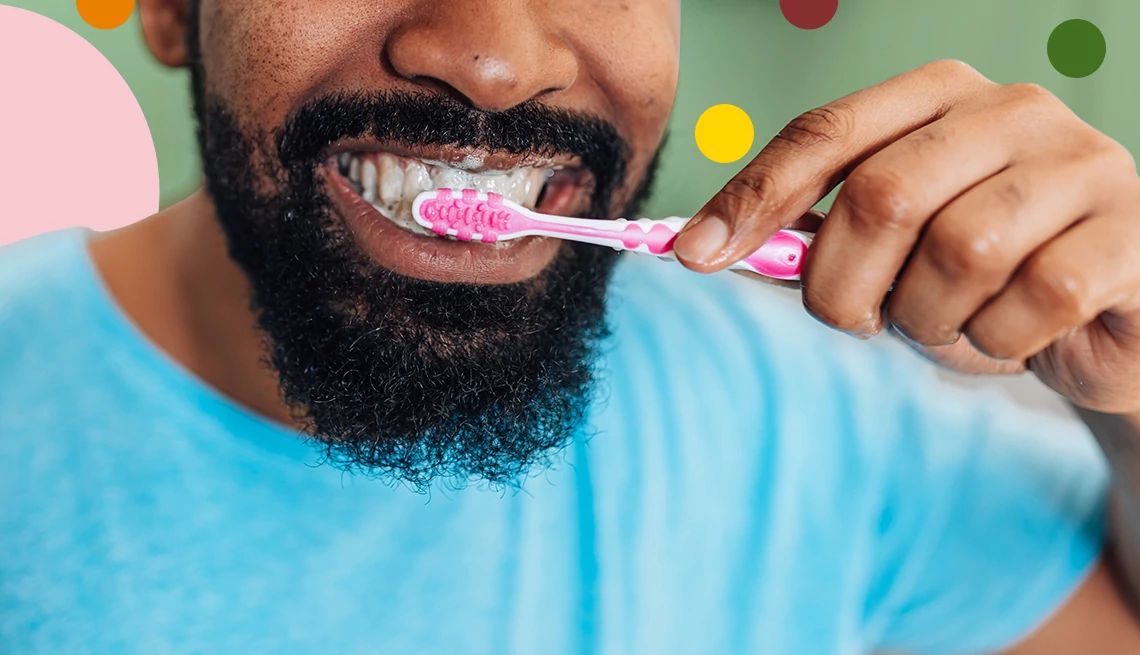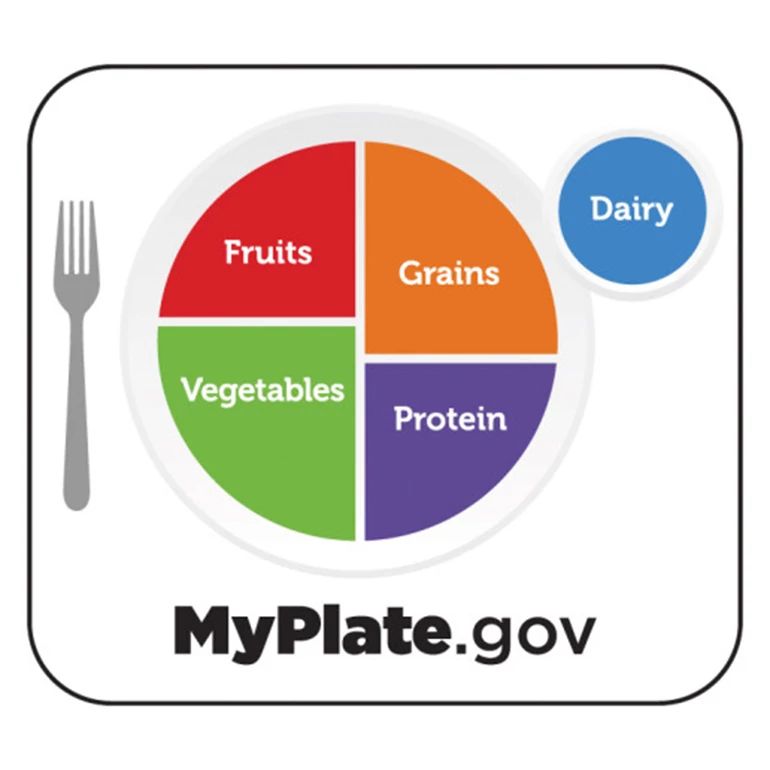“Poor sleep is a big risk factor for weight gain. There’s a lot of caring for the body that happens during sleep,” Collazo-Clavell said. If you aren’t getting restful sleep, you don’t feel as refreshed and you aren’t as active — and you may resort to food to feel more alert, she said. She recommends not looking at screens before bed and having a consistent bedtime. Also, give your body time to adjust to a new sleep routine; changes don’t always stick right away.
There’s no magic number for sleep, according to Chaudhry.
It really depends on the person. Some feel rested after six hours; some need nine. “The key is making sure you have a good sleep hygiene and wake feeling rested,” Chaudhry said.
6. Brush your teeth after meals
Anecdotal evidence shows that brushing your teeth and flossing after a meal could help prevent overeating by temporarily affecting your taste buds and possibly lessening your desire to snack between meals. One study noted that brushing teeth immediately after dinner could help manage weight loss. Taking this step could become a behavior modifier, Chaudhry said. If we are in a habit of having a snack before bedtime, brushing our teeth after dinner could help avoid that. “It kind of tells [the person], OK, now my mouth is closed,” Chaudhry said. “It makes you mindful.”
However, some dental health experts advise against brushing teeth immediately after eating or drinking anything acidic, including soda, fruits and sour candies. Acid can soften your tooth enamel, and brushing immediately could take the enamel off. To prevent that scenario, you may want to wait an hour to brush to give your enamel a chance to harden again. Then, refrain from eating for the rest of the evening.
Eating a significant amount of calories close to sleep time puts you at high risk for metabolic issues, including diabetes and weight gain, Collazo-Clavell said. She recommends avoiding eating at least three hours before bed.
7. Add whey protein to your diet
Protein has been shown to help with feeling full and preventing muscle loss, especially in older populations. If you think that you aren’t getting enough protein in your daily diet, a whey supplement could help. Studies have shown that replacing part of your calories with whey protein could aid with weight loss.
“There is an issue with losing muscle mass while losing weight, and maintaining protein intake is sometimes a challenge,” Chaudhry said. She recommends aiming for 60 grams of protein per day, which can be divided into 15-30 grams per meal. It can be difficult for older populations to consume enough protein through meals alone, so a supplement could help them get to those ideal protein numbers. Just make sure there aren’t too many added sugars, calories or artificial ingredients.
It’s also important to make sure you don’t overdo your protein intake, which could lead to weight gain. Consulting with your doctor or a nutritionist may help you strike the right balance.
Additional suggestions for increasing protein in your diet are available in the AARP-backed Whole Body Reset book. The plan focuses on the timing and concentration of protein and fiber in your day.
8. Know your stress triggers and how to deal with them
Stress has long been linked to weight gain and increased difficulty in losing weight. Factors can include stress-related overeating and the impact anxiety can have on your physiology. A small clinical trial showed that implementing a comprehensive stress management program for overweight and obese adults led to significant decreases in their levels of perceived stress and the adoption of healthier dietary patterns.
Understand your stress triggers, then build a conceptual framework for what you will do when stress hits, Chaudhry said. “Say, ‘If I’m stressed, I’m going to go out or take a walk outside or call a friend,” rather than reaching for a snack. Chaudhry recommends using a meditation app daily to manage stress.
9. Understand the role loneliness plays in weight
A 2023 advisory from U.S. Surgeon General Vivek H. Murthy noted that the nation’s “epidemic of loneliness and isolation” is a public health crisis. Social disconnection can shorten lives by about the same amount as smoking 15 cigarettes per day, according to the advisory. Older populations are particularly vulnerable because they often do not make friends as easily as they did when they were younger. That loneliness can lead to turning to food for comfort and not wanting to do physical activity on their own.
“I think there is a factor of loneliness in weight gain,” Chaudhry said. To combat that loneliness, she encourages her patients to forge social connections. “I talk to my patients about what it is that you enjoy, where do you find a sense of community?” That could be a community center or church or finding a walking buddy, which would encourage physical activity. “If a neighbor knocks on your door and wants to go for a walk, you’ll probably go,” Chaudhry said. Such activities could help you find a healthier lifestyle, even if they are not specifically focused on weight loss.
10. Remove easy access to unhealthy foods
Stimuli control can be a significant factor in weight loss. If you walk into the house and the first thing you see is a cookie jar sitting on a shelf or a bowl of candy on the counter, it makes it much easier to grab a treat without thinking. Keeping temptation out of sight can prevent such impulses.
If you’re busy during the week, Chaudhry recommends dedicating time for meal planning on the weekends so you are not scrambling at the last minute to find something to eat on a daily basis or grabbing convenience items.
“One thing I suggest to all my patients trying to lose weight, reduce their salt intake or cut added sugar from their diet, is before you even walk into the grocery store, create your do list in advance – the list of things that you know you want to buy – and your do not buy list – the items you want to avoid,” says Michele Arthurs, MD, a board-certified family medicine physician and director of the Center for Healthy Weight and Lifestyle Medicine at Kaiser Permanente in the Washington, D.C. area.
Think of your grocery cart the same way you’d balance your dinner plate—half should be filled with vegetables, while protein and carbohydrates each take up a quarter, she says. Start in the produce section and let fresh fruits and vegetables take up most of your cart.
11. Be open to taking breaks from your weight loss routine
When you have a splurge weekend away and gain a few pounds, it can be very discouraging, and you may want to throw in the towel. But research shows those weekends may help you reach your ultimate goal.
When people set a weight loss goal or routine and “something gets in the way of that, the person can feel like all is lost,” Collazo-Clavell said, but it can actually be a good strategy to give yourself some “this is not the routine” time. Be prepared for that holiday, vacation, wedding or other time away when you can’t adhere to things the way you would normally.
“Have the confidence to know that you will get back on track to the good behaviors you were doing before. Recognize that life will get in the way, interruptions will happen, but don’t let that bring you down,” Collazo-Clavell said.
12. Keep a cooler in your car
If you’re always on-the-go, its easier (and more economical) to have healthier food choices with you than going to a fast food drive-through or grabbing processed foods for convenience. Consider pre-cut vegetables, fruit or other whole foods to store with you for a healthy meal or snack, Arthurs suggests.
13. Journal your food intake
Journaling or keeping a food diary may help you better understand your eating habits and what you’re regularly munching on—both the good stuff and not-so-good stuff. By tracking your eating habits, including the foods you consume, the portion sizes, the timing, and your emotional state, can help you understand patterns and behaviors that may impact your health goals, according to Harvard Medical School.
Research suggests that people who track their diet, exercise, and weight are more likely to lose weight.
Start by noting what you eat, how it’s prepared, portion sizes, and when you eat. Also, track the context—who you’re with, what you’re doing, and how you feel. This helps you spot patterns in your habits and gives you a clear picture of what you eat throughout the day.









































































More From AARP
6 Simple Strategies for Sleeping Through the Night
Tips for getting the deep sleep you need. Plus, how to get back to sleep if you wake in the wee hours
7 Foods That Don’t Deserve Their Bad Reputations
Science and guidelines have changed, so your choices can too
Can Stress Advance Aging?
Its impact on the immune system could speed up the process, study finds
Recommended for You